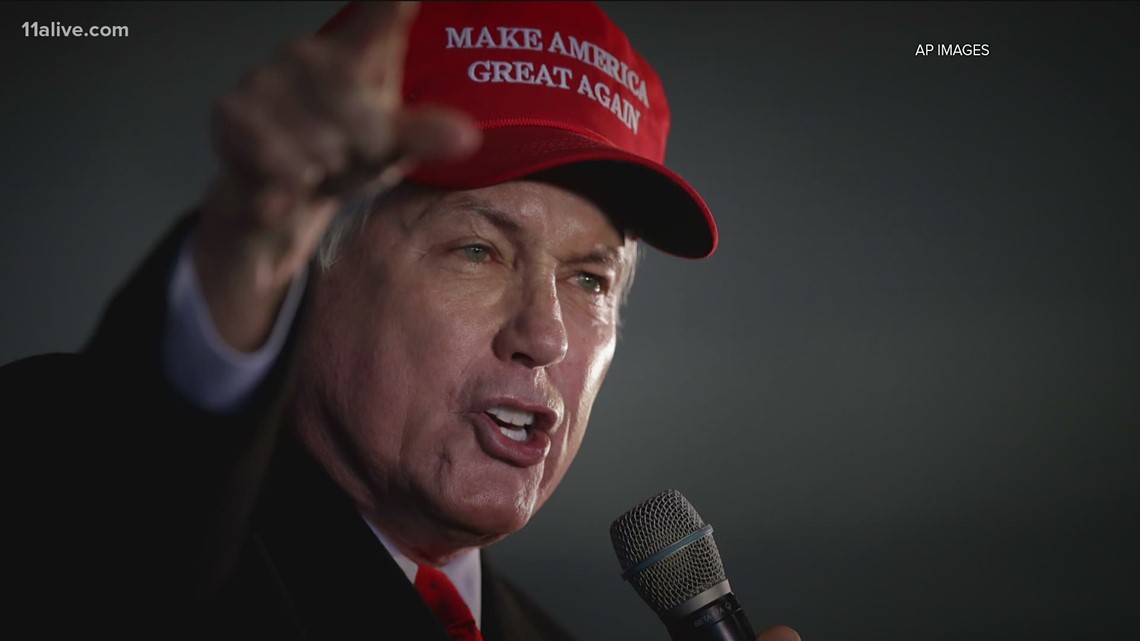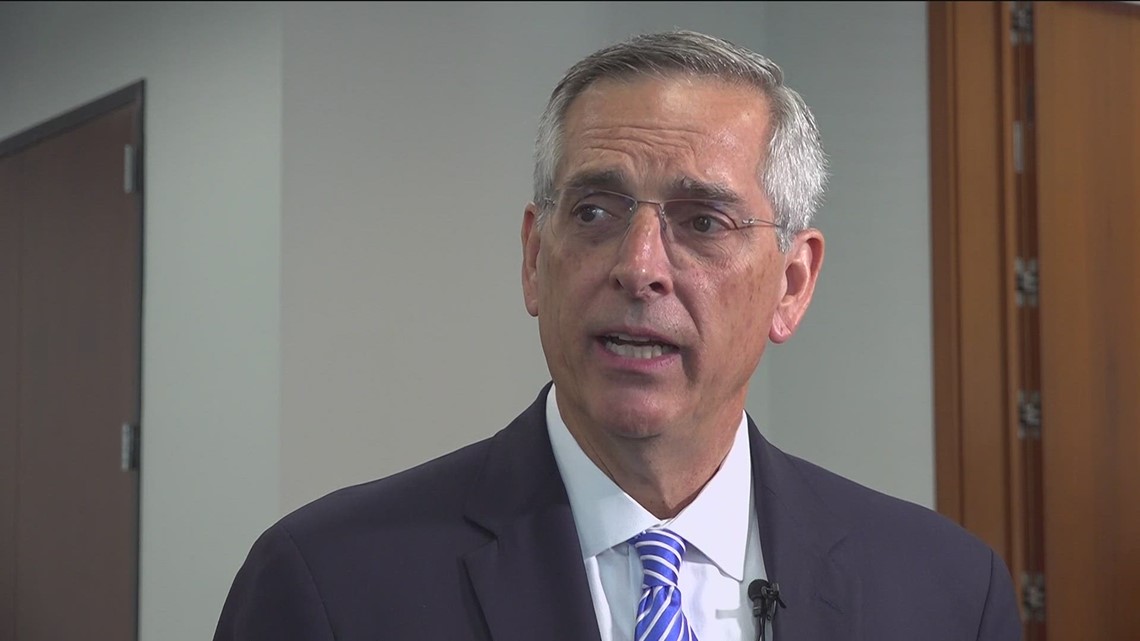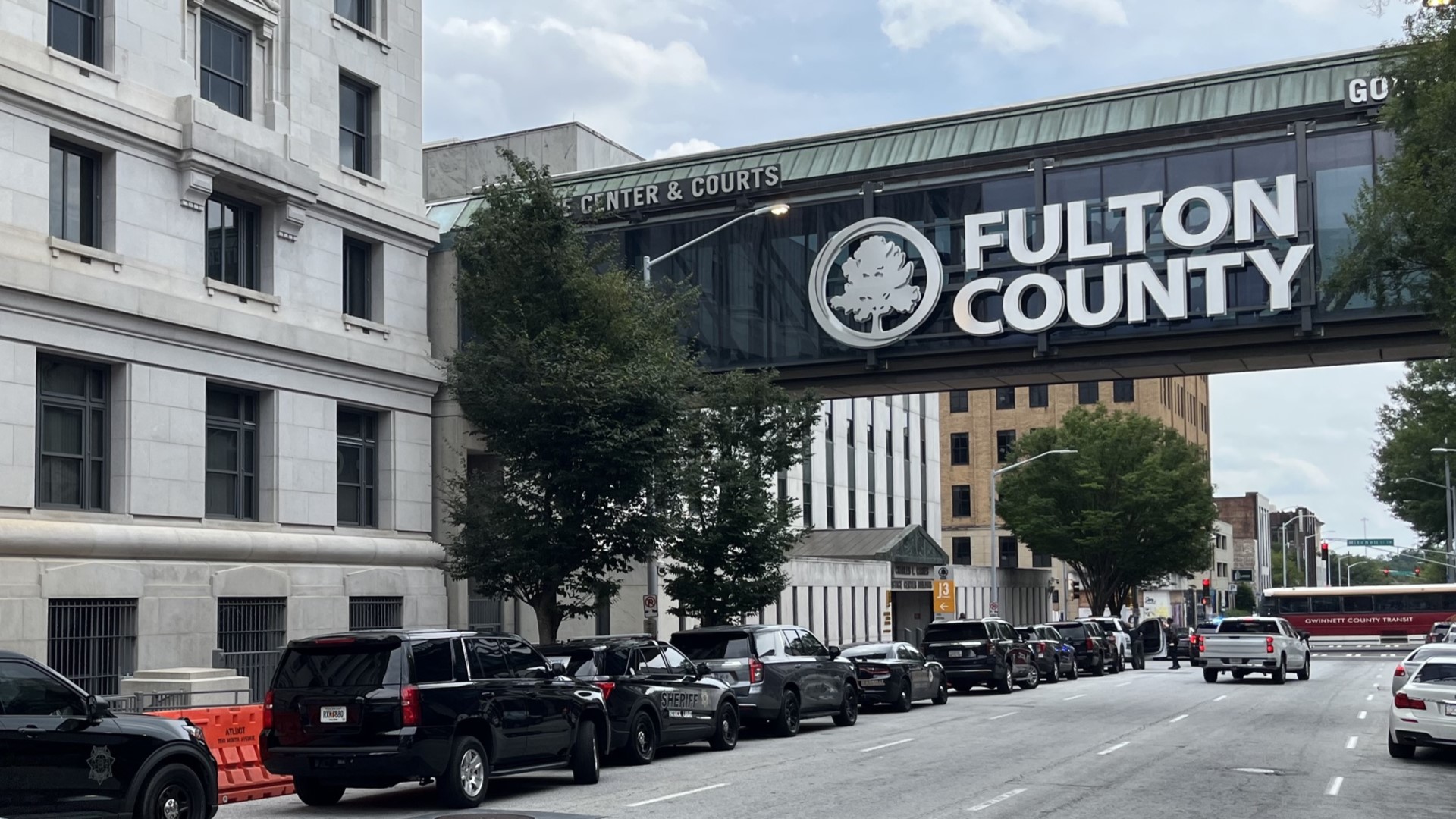ATLANTA — The Fulton County District Attorney's Office identified more than a dozen witnesses in its 2020 election case Wednesday, ranging from pro-Trump lawyer Lin Wood to the chief operating officer of a technology firm that copied sensitive voting data in a south Georgia county.
Prosecutors revealed the names in a court filing alleging that six defense attorneys may have conflicts of interest because they previously represented other defendants or state witnesses in the sprawling racketeering prosecution.
Some of the witnesses listed previously testified during special purpose grand jury proceedings. Others served as Trump presidential electors but were not indicted by Fulton County jurors. Prosecutors also said one of the current defense attorneys is a witness in the case.
It's unclear how many of the witnesses identified by the state may have accepted immunity deals in exchange for their testimony. At least half of the Trump electors accepted deals offered by prosecutors, according to court filings from earlier this year.
The Fulton DA's Office is requesting that "the Court inquire into these circumstances and take such appropriate remedial measures as it deems necessary."
"There is a significant risk that the Rules of Professional Conduct may be violated, which may compromise the rights of certain witnesses for the State of Georgia should those witnesses be cross-examined by their former attorneys," prosecutors wrote.


Who are some of the witnesses?
- Georgia Secretary of State Brad Raffensperger - The state's top election official, Raffensperger had the infamous Jan. 2, 2021 phone call with Donald Trump. This was the call where the president said he wanted to "find" enough votes to overturn Joe Biden's victory in the state. Raffensperger testified during Mark Meadows' hearing earlier this month. Meadows wants his case moved from Fulton County to federal court.
- Patricia Raffensperger- The wife of Georgia Secretary of State Brad Raffensperger, they were subjected to death threats following the 2020 election. She was also present during the Trump call.
- Lin Wood- The Fulton County DA’s Office said in a court filing that Wood hosted meetings at a South Carolina plantation “for the purpose of exploring options to influence the results of the November 2020 elections in Georgia and elsewhere." Those who allegedly attended the meetings include Sidney Powell, Michael Flynn, and others associated with the Trump campaign. The special purpose grand jury recommended that Wood be indicted. Wood told The Hill in an interview that he's just responding to a subpoena. He said he hasn't turned on Trump.
- Former Georgia Lt. Gov. Geoff Duncan- As lieutenant governor, Duncan served as president of the state Senate. Lawmakers there were subjected to pressure from Trump allies to overturn the election. Trump attorney Rudy Giuliani and others argued that the election was stolen during a seven-hour Senate subcommittee hearing on Dec. 3, 2020. Duncan testified before the regular grand jury that indicted Trump and 18 others last month.
Trump electors Vikki Townsend Consiglio, Gloria Kay Godwin, James Kenneth Carroll, and Carolyn Hall Fisher- They were four of the 16 Republicans who signed and submitted Electoral College documents claiming Trump won the 2020 election. The four along with another witness, CJ Pearson, filed a lawsuit against Brian Kemp and other state officials over the election. Only three electors — Cathy Latham, David Shafer, and Shawn Still — were indicted.
Coreco Ja'Quan "CJ" Pearson- Pearson was slated to serve as a Trump elector. He attended the Dec. 14, 2020, meeting at the state capitol. However, Pearson wasn't able to serve because he moved to Alabama for college, the New Yorker reports. Pearson and the four elector witnesses sued Brian Kemp and other state officials over the election.
Paul Maggio- Maggio is the COO of SullivanStrickler, an Atlanta-based data acquisition firm that spent hours copying sensitive voting software and equipment in Coffee County. Prosecutors allege the work was completed under a written agreement with attorney Sidney Powell. The company is also identified as a witness in the court filing.
Chris Anulewicz- Anulewicz represented Raffenfensperger and members of the Georgia State Election Board in the Trump v. Raffensperger lawsuit. The Fulton County District Attorney's said in its filing that Anulewicz is a witness because he represented Raffensperger during the Jan. 2 call. Attorneys representing the Trump campaign have characterized the call as a settlement negotiation in court filings. Prosecutors reject that claim. Anulewicz currently represents Bob Cheeley in the election case.
Keith Williams- Based on the attached documents prosecutors filed in court, it appears that Williams serves as General Counsel for the Speaker of the Georgia House of Representatives. Republican David Ralston served as House speaker following the 2020 election. Trump called him and attempted to get Ralston to convene a special session. Ralston rejected Trump's request.
- Members of the State Election Board
- Members of the Georgia legislature


Who are the attorneys that may have conflicts?
Aside from Anulewicz, the five attorneys who prosecutors alleged may have conflicts of interest include:
- Amanda Clark-Palmer - Clark-Palmer currently represents Ray Smith III in the case. She previously represented SullivanStrickler LLC, Duncan and other members of the state legislature during the special purpose grand jury investigation. In a statement to 11Alive, Clark-Palmer said there is no conflict of interest.
- Scott Grubman - Grubman currently represents Kenneth Chesebro. Grubman previously represented the Raffenspergers during the special purpose grand jury proceedings.
- Harry MacDougald - MacDougald currently represents Jeffrey Clark. MacDougald, alongside Powell and Wood, previously represented Pearson, Latham, and the four witness electors in the Pearson v. Kemp lawsuit. MacDougald also worked with Wood on the Wood v. Raffensperger lawsuit over the 2020 election.
- Bruce H. Morris - Morris currently represents Ray Smith III. Morris represented Maggio during the special purpose grand jury investigation.
- Donald Franklin Samuel - Samuel currently represents Smith. Samuel previously represented Duncan and other members of the Georgia legislature during the special purpose grand jury investigation. Samuel also represented Williams during the special grand jury investigation and in subsequent investigative interviews.
What else happened on Wednesday? What's next?
The motion came on the same day as a court hearing for the three Trump electors who are seeking to have their cases moved out of Fulton County Superior Court.
Judge Steve C. Jones didn't make a ruling after the roughly three-hour hearing, but said he expects to make a decision soon about the fates of Latham, Shafer and Still.
The three Republicans didn't appear at the hearing. Their attorneys argued they passed the three-condition test needed to move their case on to federal court. They were federal officials who acted under the asserted authority of their office.
Craig Gillen, an attorney for Shafer, argued that the elector role is spelled out in the U.S. Constitution and the 1887 Electoral Count Act. Gillen said the Democratic and Republican presidential electors were "contingent" until Congress made its final ruling because an election challenge filed by Trump and Shafer hadn't been resolved by Dec. 8, 2020 — the so-called "Safe Harbor" date.
Further, Gillen and other attorneys for the electors argued that state law covered only the appointment process of electors. Federal law oversees the casting of Electoral College ballots, and the governor's certification is not the final word in the process. That is the first step that occurs before an election can be challenged, they said.
Attorneys for the electors also cited the Democratic electors during Hawaii's 1960 election as proof that what happened in Georgia was proper.
During that race, John Kennedy already won the presidency, but Richard Nixon was declared the winner in Hawaii by 140 votes. Democrats challenged the results, and a court-ordered recount was ongoing. With the results in question, both electors met and sent their documents to Congress. The recount found that Kennedy won by 115 votes, and the state's electoral votes went to Kennedy.
Special Prosecutor Anna Cross rejected those arguments, calling them "wrong. Nonsense. Unsupported. Fantasy," citing the defense's "lack of official evidence." The DA's office said the electors were indeed "fake" who acted to further the goals of the Trump campaign.
Cross also argued that if an election challenge was successful, the proper remedy would be a new election — not handing the victory to Trump.
This is the third removal hearing tied to the 2020 election cases. A federal judge ruled against former White House Chief of Staff Mark Meadows' bid to remove. Meadows appealed the ruling to the U.S. Court of Appeals for the Eleventh Circuit and is awaiting a decision. Former DOJ official Jeffrey Clark appeared before Jones on Monday. No ruling has been issued in the case.
The joint trial of Chesebro and Powell is set for Oct. 23. They have been split from the remaining 17 defendants in the case. Fulton County Superior Court Judge Scott McAfee said he hopes to have a jury sworn in for their trial by Nov. 5.

